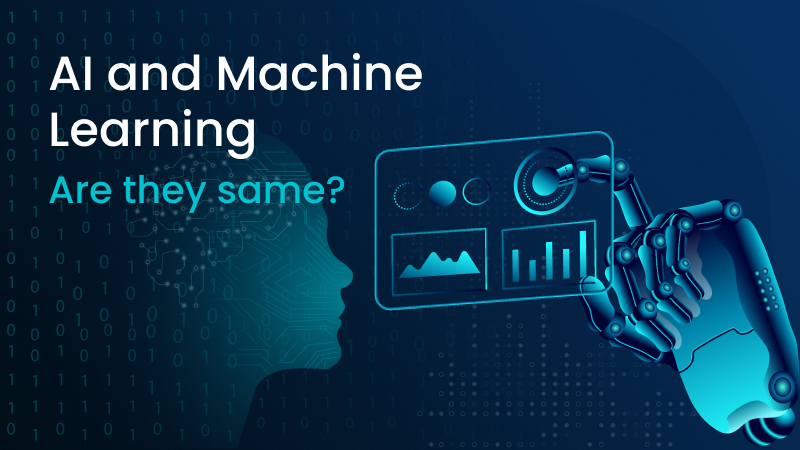Artificial Intelligence and Machine Learning : Are they same?

Artificial Intelligence and Machine Learning are two interconnected fields that have revolutionized technology and transformed various industries. While the terms “Artificial Intelligence” and “Machine Learning” are often used interchangeably, they refer to distinct concepts.
Artificial Intelligence (AI) is like the umbrella term that covers a wide range of technologies and approaches. It’s like the big picture of creating intelligent systems that can perform tasks that typically require human intelligence. Within AI, we have Machine Learning (ML), which is a specific subset or technique used to teach computers how to learn and make decisions from data.
Think of AI as the overall concept that includes things like natural language processing (NLP), robotics, and even computer vision. It’s like building systems that can understand and interact with humans, perceive the world, and make intelligent choices.
On the other hand, Machine Learning (ML) focuses on the algorithms and statistical models that enable computers to learn patterns and make predictions or decisions from data. It’s like teaching a computer to recognize patterns, make classifications, or even generate insights from large datasets.
For example, when you use a virtual assistant like Siri or Alexa, that’s an AI application. These assistants can understand and respond to your voice commands, providing a conversational experience. The technology behind them often involves Machine Learning techniques to process and understand the spoken language.
Another example is spam detection in your email. ML algorithms analyze millions of emails, learning patterns of what constitutes spam, and can then accurately identify and filter out unwanted messages.
So, AI is like the bigger concept, while ML is a specific technique used within AI to enable machines to learn and make intelligent decisions. They work hand in hand to create impressive applications and technologies that impact various aspects of our lives.
Now, let us explore the major skill differences between Artificial Intelligence and Machine Learning which is crucial for individuals interested in pursuing careers in AI, ML, or related fields, as well as for organizations seeking to leverage these technologies effectively.
Artificial Intelligence
Artificial Intelligence refers to the development of computer systems capable of performing tasks that typically require human intelligence. AI encompasses a broad range of techniques and approaches, including machine learning, natural language processing, computer vision, and robotics. AI focuses on building systems that can learn from data, reason, make decisions, and perform complex tasks with minimal human intervention.
To know how AI is tranforming the recruiting fields, read our blog Talent Acquisition process made effective by AI.
Key skills in the field of AI include:
Data Analysis and Interpretation: AI professionals need a strong foundation in analyzing and interpreting vast amounts of data to extract meaningful insights and patterns.
Algorithm Design and Optimization: Developing efficient algorithms to solve complex problems is a vital skill in AI. It involves designing, implementing, and optimizing algorithms to achieve desired outcomes.
Deep Learning: Understanding and applying deep learning techniques, such as neural networks, is crucial for AI professionals. Deep learning enables systems to learn from large datasets and make accurate predictions or decisions.
Machine Learning
Machine learning, on the other hand, is a data-driven approach to artificial intelligence. It involves training algorithms to analyze vast amounts of data and learn patterns, allowing machines to make predictions and decisions without explicit programming. Machine learning excels in tasks that require processing large datasets, identifying patterns, and performing repetitive tasks with speed and accuracy. Its ability to analyze massive amounts of information enables it to uncover insights and make data-driven predictions.
Strong Foundation in Mathematics and Statistics: A solid grasp of linear algebra, calculus, probability theory, and statistics enables understanding and developing machine learning algorithms, analyzing data, optimizing models, and interpreting results effectively.
Proficiency in Programming and Data Manipulation: Proficient programming skills, particularly in Python, facilitate data manipulation, preprocessing, feature engineering, and working with machine learning libraries, enabling efficient model development and implementation.
Understanding of Machine Learning Algorithms and Techniques: Knowledge of various machine learning algorithms, including supervised and unsupervised learning, ensemble methods, deep learning, and reinforcement learning, allows for appropriate algorithm selection, model design, and optimization for different problem types and complexities.
Intersection and Collaboration
Despite their distinct focuses, there is a significant intersection between Artificial Intelligence and Machine Learning. ML techniques, such as neural networks, are extensively used in AI for tasks like pattern recognition and predictive modeling. Furthermore, AI can be used to enhance the capabilities of ML systems by incorporating intelligent decision-making and adaptive behaviors. This collaboration between the two fields leads to the development of advanced AI applications and intelligent systems.
Remember, AI chatbots like ChatGPT by OpenAI are excellent examples of the intersection between AI and ML, providing intelligent and interactive conversational experiences powered by machine learning algorithms.
Conclusion
Artificial Intelligence and Machine Learning are complementary fields with distinct skill requirements. AI professionals need expertise in data analysis, algorithm design, and deep learning, while ML professionals focus on low-level coding, assembly language, and embedded systems development. Understanding the skill differences is crucial for individuals pursuing careers in AI or ML and organizations seeking to leverage these technologies effectively. By recognizing the unique characteristics and applications of AI and ML, professionals and organizations can harness the full potential of these transformative technologies.
